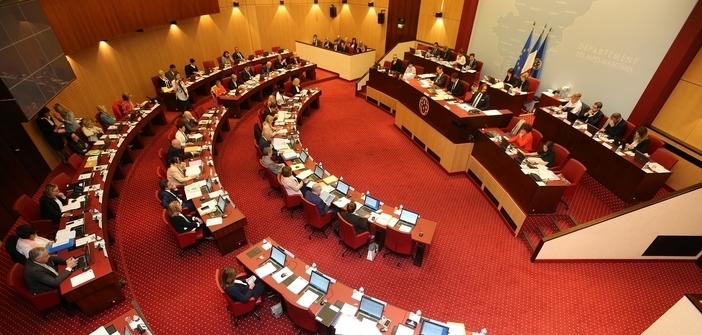A dull and flat session ratified the positive results of the 2017 financial accounts, the last under the responsibility of Eric Ciotti, who had to pass the torch to his First Vice-President Charles-Ange Ginesy in the second semester, in accordance with the law prohibiting the accumulation of mandates.
And yet, he hasn’t completely stepped away from affairs, as he was the one to give a political interpretation of these results.
Speaking as the president of the finance committee during the debate for the examination and approval of the 2017 Administrative Account, he indulged in a genuine plea that had nothing to do with examining the results, a sort of general guideline that allowed him to champion the sound management of public finances.
His remarks, essentially verbal provocations, “there are those who increase debt, those who raise taxes, and those who do both,” were directed, without explicitly saying so and without naming him, at Christian Estrosi. The aim was to create conditions for a clear divide with ‘the marchers marching towards En Marche’—as he defines them—that is, the group of metropolitan elected officials representing the ‘Bold France’ trend, as clearly as possible.
In reality, he does not tolerate the presence of the ‘Estrosist’ group within the departmental majority ranks, although they lay claim to it. For him, the departmental majority must be ‘pure’ but above all… tough!
These propositions triggered a reaction—indeed, that was the goal—from Jean-Paul Segura, one of the leaders of this group, who reminded him of his, if not complicity, at least fidelity until recently with the person he is now criticizing without reservation.
Is it a story of personal ambitions where everything that was good becomes what is now wrong?
As a result, Charles-Ange Ginésy’s opening speech was overshadowed!
The President of the Department spoke at length, highlighting the various axes of territorial policy and claiming good results and, above all, sound financial management.
And he particularly recalled:
(i) the stability of operating expenses (at 930 million euros compared to 935 in 2016)
(ii) the reduction of debt (-34.6 million euros in 2017) by 100 million over 4 years, which brings the debt repayment capacity to 6.1 years (editor’s note: also thanks to the sale of shares of the NCA Airport management company worth nearly 100 million euros)
(iii) no tax increase (editor’s note: in fact, the Department benefited from the increase decided by the State in the rate)
(iv) an investment policy of 155 million euros
This record was positively commented on by all elected officials, but the opposition wanted to point out certain shortcomings.
To Marie-Louise Gourdon (PS), the share of the budget allocated to solidarity is insufficient, despite it being the department’s main, priority, and primary competence. Her criticism is particularly directed at the management policy of RSA (5,070 suspensions in 2017, +13% compared to 2016).
Francis Tujague (PCF) emphasized “the weakened means of action (-126 posts in 2017 and nearly 900 since 2008) for public services for which the Department is responsible” and cited the case of staff discontent in nursing homes (EPHADs).
The elected official also took the opportunity to raise issues concerning the Paillon and Roya Valleys: the Tende road and rail tunnels, whose delayed reopening creates a difficult situation for local and cross-border mobility.
Two other items were the subject of discussion and debate:
The reinforcement of the insertion-employment plan to combat unemployment which, while it shows a reduction of 0.6% in a year, remains strong, particularly for the “long-term” category.
The policy of support for the elderly, a particularly sensitive subject in the department where more than 350,000 people over the age of 65 live.
Reinforcing investment in EPHADs can only be a first response to an issue that must be addressed in its entirety, especially given the prospect of progressively longer life expectancy.
The Departmental Assembly also approved the establishment of the Metropolitan Hub between the CASA, Pays des Lérins, Pays de Grasse, and Alpes d’Azur communities, which will be headquartered in Grasse. A precursor to a future metropolis like Nice Côte d’Azur? Time will tell.
In the near future, it involves consultation, pooling of resources, and skills to bring out synergies and establish joint action plans.
In the motions and wishes, we find the trademark of the deputy of the First Constituency of the Alpes-Maritimes, a staunch opponent of the Macron government, and its 100% critic, regardless of the subject: refusal of the financial contract proposed by the State to the 322 local entities, demand to withdraw the reduction to 80 km/h of the maximum road speed.
Regarding the first point, President Ginesy justified the rejection by a dual motivation: one of principle, “I refuse to be complicit in a phenomenon of recentralization,” referring to “the principle of free administration of local authorities,” and another, the fact that “our budget strategy pursued since 2009—(editor’s note: at the end of 2008 Eric Ciotti replaced Christian Estrosi in the presidency) allows us to far exceed the objectives proposed by the Law.”
The conclusion is even more divisive: “I do not intend to sign this fool’s agreement. What is the compensation for the Department? None.”
The eminently political nature of this motion is evident: the so-called financial contract law aims to promote a common path for controlling community spending with the certainty for them of the invariance of financial endowments for the next three years. If a community is already on this trajectory, so much the better for them.
So why make it a political case if not to set oneself up as an opponent to the Government and place the “Estrosist” group—the City of Nice signed this agreement and the Metropolis will follow—in a position not to vote for it?
You must not be… fooled—as Charles-Ange Ginesy himself says so well!


